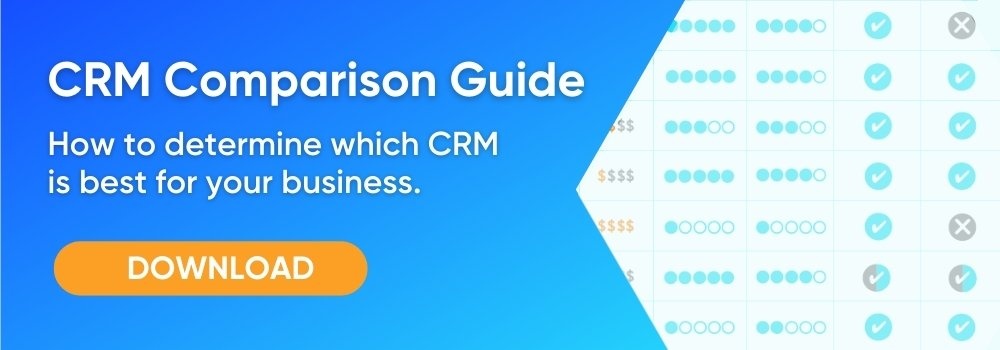Utilizing task automation in your CRM can open up more opportunities to improve alignment between sales and marketing teams, streamline data points, and help form strong customer relationships. Automating your marketing and sales efforts within your CRM allows you to nurture prospects with human connection each step of the way, without requiring too much time and resources from your internal team.
In this blog, we’ll discuss the various ways to use task automation within your CRM. But first, let’s nail down (or recap) what a CRM is, and what marketing and sales automation entail.
What is a CRM?
A Customer Relationship Management (CRM) system helps teams manage their customer data and customer service interactions. CRMs are an all-in-one business platform that not only allows teams to store user info and analyze contact interactions but can also automate tasks and provide helpful business reports that allow businesses to be more efficient and effective with their processes. CRM applications have been at the backbone of many successful businesses since the 1980’s, but we aren’t in the ’80s anymore. It’s the 21st century and most CRM software is cloud-based now and is able to be used anyplace, with multiple functionalities, creating an efficient business tool that saves your business time and money.
What is marketing and sales automation?
Marketing and sales automation is the use of different forms of AI (artificial intelligence) to streamline tasks and activities with minimal human input. With automation, marketing and sales teams can send the right messages at the right time to the right people, allowing them to save time and be more efficient with their efforts.
Marketing automation and sales automation go hand in hand, and to maximize effectiveness, should be integrated into one platform, like HubSpot or Salesforce or another CRM platform, to ensure both teams are aligned and working efficiently.
Types of Task Automation to Use Within Your CRM
You can automate your business processes from start to finish. Task automation allows your marketing, sales, and customer service teams to focus on more valuable projects instead of simple, repetitive, and low-ROI tasks. I could fill an entire WEBSITE with how automation benefits teams and streamlines tasks, but here is a quick overview of some nifty ways to automate your marketing, sales, or service tasks within your CRM to ensure everyone is working effectively.
Marketing Automation:
Marketing automation helps build the customer relationship through tracking specific metrics within email, website, and contact management actions. By leveraging automation tools to track metrics such as open rates, session durations, and location, your team can improve user engagement and streamline marketing efforts so they can focus on high-value tasks.
Marketing Automation software can execute and manage repetitive marketing tasks within your CRM like:
Email, social and content marketing
With so many avenues to connect with your audience, it is important to create a streamlined and efficient messaging system. Your CRM should include features that allow you to send emails, schedule social media posts, and create content for your blog, website or landing pages, making it a truly robust marketing and sales platform.
Utilizing automation in your email, social media and content marketing allows complete control over when content is sent, who it’s sent to, and how it is delivered. This allows your team to focus on strong content messaging instead of what time they need to get onto their email or social accounts to send a mass email or social posts to all their contacts, for example.
Lead Nurturing
Your CRM is all about your contacts and making sure you have all the tools you need to create relationships and eventually turn leads to loyal customers—this is a process we call lead nurturing. There are different phases your contacts may fall within the buyer’s journey (awareness, consideration and decision). Using automation strategies and tools you can send personalized messages to each of your contacts based on their previous interactions within your CRM (previous emails opened, web pages viewed, etc.) to send them targeted messages that nurture each contact throughout each stage with little to no time from your team.
Contact Management and Reporting
No need for a business card organizer or outdated spreadsheets of customer information! Content management and reporting tools allow you to keep up-to-date contact information in one place and digitize business engagement. Instead of spending time following up with new customers, or updating contact records, marketing automation tools within your CRM can trigger follow-up communication at predetermined times, and can automatically update and sync contacts records anytime there’s a change in their information or previous business interactions.
Monitoring online behaviors
Understanding user behavior on your website (where they are coming from, how long users stay on specific pages, how many times they search, etc) is key to sending targeted messages that help nurture users through the sales funnel. No matter the traffic levels on your website, is there enough time to go through each individual user’s website behavior? A1WebStats did a survey with their users and found that the average website traffic per month is 694 users a month. Marketing task automation eliminates the need for a staff member to spend countless hours sifting through all 694+ user’s behavior, and instead holds all information in one place, automatically, to efficiently understand your contacts and to make informed decisions about what is or isn’t working with your marketing efforts.
SEO
SEO is key to marketing strategies, but there is a lot of research and repetitive behaviors that can dig into your daily processes. You can save time by automating keyword research, SEO optimizations, and audits all from within your CRM.
Workflow processes
Workflows help streamline a robust experience at any step in the buyer’s journey. Utilizing automation to trigger targeted content for each of your contacts based on their previous interactions saved within your CRM creates an efficient process for your team, and doesn’t bombard prospects with unnecessary information.
By automating these tasks, your team can create a universal yet personalized experience for each prospect, without taking extra hours from your team.
Sales Automation
Sales platforms use automation to organize, manage and nurture leads, which ultimately saves sales teams time so they can focus on higher priority tasks.
Here are a few ways you can utilize task automation within your CRM to help your sales team members:
Activity logging
Sales automation allows your team to track and understand when and how often reps connect via email, phone, or even face to face. Furthermore, using automation tools can help your team track notes, tasks and general information to keep records so anyone has access to assist and understand the depth of the prospect’s relationship with your team.
Lead record creation
Your CRM should have the ability to create new contact records or add new contacts as your contacts interact with your business (fill out a form to download a resource, or enter their email to join your mailing list, for example). Automating data entry and record creation allows your team to spend more time connecting with prospects versus filling out contact information, assigning which prospect goes to which sales rep and also keeping bookkeeping. And by having a CRM that’s used by your marketing and sales teams, your contact records will always be up to date for both teams.
Personalized emails
Did you know personalized emails produce 20% more sales opportunities compared with non-personalized emails? Sales task automation helps your team use details from activity logging and lead record creation collected and stored within your CRM to create a personalized experience for each prospect involved.
Lead management
Using automation to help sort and prioritize leads in your sales pipeline allows your team to approach prospects in the most efficient amount of time, leading to a personalized purchase journey with the most qualified rep for each lead.
Manage appointments
Many sales automation tools can be used to track and manage appointments, such as HubSpot’s appointment and meeting scheduler or Zoho’s appointment planner. This software allows prospects to book times and calls with sales representatives, and immediately be added to the sales rep’s calendar. And by having this software integrated within your CRM you can automatically track data reported from this software and have it connected to their contact page.
Here you can see in Zoho’s appointment manager what meetings have been scheduled and robust analytics for past appointments as well. Storing this in your CRM allows your team to use this data to better understand how your customers interact with you.
Sales enablement
Sales enablement is the process of providing resources to sales team members to increase closed deals and can help eliminate lost time due to back and forth emails or never lose a deal due to forgotten follow-up. Because your CRM is an all-in-one platform for your marketing and sales team members, there are also many repetitive tasks your sales reps and managers continuously perform that you can use task automation within your CRM to help streamline.
Using automation techniques creates a streamlined process that aligns sales and marketing teams. This keeps the user experience consistent from prospect to loyal customer. Figuring out which CRM automation techniques benefit your team’s processing can help manage your time more efficiently and create a robust brand experience for end-users.
Service Automation
Customer service task automation is the process of resolving customer inquiries with less human interaction and therefore less time from your internal teams. Using resources that help streamline the customer experience creates stronger brand loyalty.
Chatbots
Customer service automation doesn’t mean customer service is going to lose its personal touch. Automation tools allow a personable interaction between your brand and end-users by utilizing AI chatbots to answer common questions that users tend to have on your site. Many times these use if/then statements are pre-written in the backend to determine the best answer for users.
Tidio shares a great example of how you can build a chatbot.
Help desk
Help desk software keeps operations running smoothly for your sales team. Integrating your customer service software with your CRM helps you manage user requests and keep other customer service related issues organized.
HubSpot Help desk is a customer service software that manages and automates conversations, streamlines tickets, task creating, and reporting. This helps create a customer flow for different sources and information.
Interactive Voice Response
I’m sure we have all forgotten a PIN or called a customer service line and “spoke” to an automated system for about 5 minutes until we actually reached a service representative. This is Interactive Voice Response (IVR)! IVR allows customers to ask questions or make queries via voice recognition or phone keypad. This offers more time for reps to make high-value connections with end-users that need their help.
By integrating IVR with your CRM, you can:
- Log, record and monitor interactions
- Ensure that calls are routed to correct department
- Maintain quality assurance
There is a wide variety of CRM automation tools that your business can use with benefits within each. No matter the size of your business, the desired functionality of your CRM automation tool, there is an option for you.
HubSpot CRM Automation
There are a variety of CRM platforms that your team can use to organize and develop relationships with prospects and customers. You can choose from HubSpot, Salesforce, Freshworks, and many other options, but here at Pyxl we use HubSpot! We are able to store lead information, automate processes and streamline tasks through HubSpot. It’s a one-stop-shop that our entire team uses to stay connected within the business and with our contacts!
Pyxl is a HubSpot Platinum Solutions Partner, which means our team of experts is here to help you get set up for success on HubSpot! We guide your team through HubSpot to understand and implement a strong business strategy, that’s why we help you with the implementation process!
Partner with Pyxl
Do you currently have a CRM for your business? If you’re on the lookout for a robust CRM to jumpstart your business’s automation tasks, contact Pyxl! We’re here to help you find a CRM that works for your business, and we’ll work with you to implement your platform so you’re set up for success!
Already have a CRM but looking into what Pyxl can bring to your business? Check out the digital services we offer!
Updated: Apr 13, 2022
 Kati Terzinski
Kati Terzinski

 Erin Murray
Erin Murray